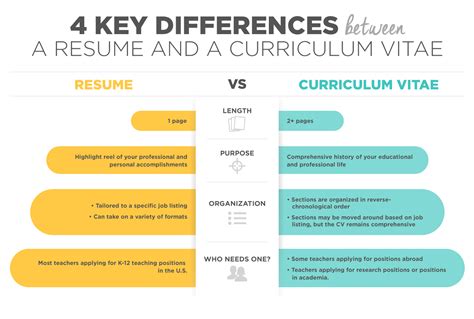Resume Vs. Curriculum Vitae: Understanding The Difference

When it comes to job applications, one of the most important documents you’ll need is a resume or a curriculum vitae (CV). While these terms are often used interchangeably, they actually refer to two different types of documents. In this post, we’ll explore the differences between a resume and a CV, and when to use each one.
What is a Resume?
A resume is a one- to two-page document that summarizes your work experience, education, skills, and achievements. It’s typically used for job applications in the private sector and is tailored to the specific job you’re applying for. A resume should be concise, easy to read, and highlight your most relevant qualifications for the job.
Resume Sections
A typical resume includes the following sections:
- Contact Information
- Objective or Summary Statement
- Work Experience
- Education
- Skills
- Awards and Achievements
- References (Optional)
What is a Curriculum Vitae (CV)?
A curriculum vitae, or CV, is a more detailed document that outlines your academic and professional accomplishments. It’s typically used for academic or research positions, fellowship applications, or grants. A CV can be several pages long and includes a comprehensive list of your education, publications, presentations, research, and professional affiliations.
CV Sections
A typical CV includes the following sections:
- Contact Information
- Education
- Research Experience
- Publications
- Presentations
- Teaching Experience
- Professional Affiliations
- Awards and Honors
- References
Resume vs. CV: Which one should you use?
Knowing the differences between a resume and a CV can help you determine which one to use for your job application. Here are a few guidelines:
- If you’re applying for a job in the private sector, use a resume.
- If you’re applying for a job in academia or research, use a CV.
- If you’re not sure which one to use, check the job posting or ask the employer which they prefer.
Resume and CV Tips
Whether you’re creating a resume or a CV, here are a few tips to make your application stand out:
- Customize your document for each job application.
- Use keywords and phrases from the job posting.
- Highlight your most relevant qualifications and achievements.
- Keep your document concise and easy to read.
- Proofread for errors and typos.
- Ask a friend or mentor to review your document.
FAQs
What’s the difference between a resume and a CV?
A resume is a one- to two-page document that summarizes your work experience, education, skills, and achievements. It’s typically used for job applications in the private sector. A curriculum vitae, or CV, is a more detailed document that outlines your academic and professional accomplishments. It’s typically used for academic or research positions, fellowship applications, or grants.
When should I use a resume?
If you’re applying for a job in the private sector, use a resume.
When should I use a CV?
If you’re applying for a job in academia or research, use a CV.
How long should a resume be?
A resume should be one to two pages long.
How long should a CV be?
A CV can be several pages long, depending on your academic and professional experience.
What should I include in my resume?
A typical resume includes contact information, an objective or summary statement, work experience, education, skills, awards and achievements, and references (optional).
What should I include in my CV?
A typical CV includes contact information, education, research experience, publications, presentations, teaching experience, professional affiliations, awards and honors, and references.
Should I include references in my resume or CV?
You can include references in both your resume and your CV, but it’s not required. Some employers may ask for references separately.
Do I need to create a new resume or CV for each job application?
Yes, you should customize your resume or CV for each job application to highlight your most relevant qualifications and achievements.
What are some tips for creating a strong resume or CV?
Customize your document for each job application, use keywords and phrases from the job posting, highlight your most relevant qualifications and achievements, keep your document concise and easy to read, proofread for errors and typos, and ask a friend or mentor to review your document.
